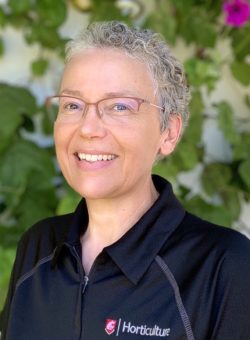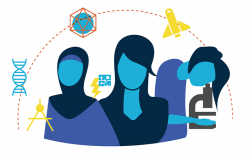Get to know Kate Evans – Creator of the Cosmic Crisp Apple, Horticulturist, and Notable Woman in STEM
Kate works and lives in the Wenatchee region where she and her team of horticulturists and plant breeders tackle some of the biggest challenges in agriculture. You may not know Kate (yet) but you’ve probably tasted some of the fruit she’s helped to create, like the Cosmic Crisp apple!
What does it mean to be a plant breeder?

As a plant breeder, I spend most of my time making new varieties of apples. I use a wide range of apples that exist in nature and work to pinpoint some of the most favorable qualities of those apples, and then I’ll take the pollen from one of the apple parents and put it onto the flower of the other apple parent. Then, I wait for them to produce a fruit that contains the all-important seeds. From that new seed, a new apple tree will grow that will have a brand new type of apple!
What was your education and/or career path? How did you get where you are now?
I’m English by birth and I received all my education while I was living in the United Kingdom. Despite growing up in another country, our educational pathways are still very relevant to education pathways in Washington. I pursued a double major science degree in genetics and plant biology. After I completed my bachelor’s degree, I went on to do a Ph.D. in plant molecular biology.
If I were to look back on how I got my start, it’s pretty simple. I really always liked plants. I spent a lot of time in my parents’ garden helping to prune roses and weeding. When I realized in high school that I could pursue a degree all about plants, that’s when the lightbulb in my head went off. Up until then, I thought if I wanted to do biology in college, I had to be a doctor. While I was studying plant biology in high school, I also became really interested in genetics after learning about and replicating, the pea plant experiments of Gregor Mendel. The fundamentals of why things are the way they are, and how genes can influence that, has always been interesting to me.
After I finished my Ph.D., I realized that I didn’t want to spend the rest of my life working in a lab. After graduating, I found a job in the U.K. that was focused on breeding apples and pears and realized I was qualified for the position and decided to apply. I learned a ton about plant breeding while on the job. For the next 16 years, I was focused on apple and pear breeding before I decided to move to the U.S. and begin the next stage of my career in Wenatchee, Washington.
What/who were some of the most important influences that guided you to STEM?
For me, it goes back to 8th grade and my biology teacher, Ms. Brammer. She was so inspiring and was responsible for helping me get really interested in biology. Once I found that love of biology, I found my path. I can still visualize my class notebook and the lessons she taught us about flower biology. I spent time pulling apart flowers as a kid and once I was able to pair my curiosity with biology, it all came together for me in that class. It just clicked. As a teacher, Ms. Brammer was really good at giving real-world examples from her own experience. It was a great way for me, and others, to learn. When you have a personalized example of science, it really helps create a deeper understanding of the material.
What is your favorite part of your STEM career?
Technically, I have many favorite parts of my job. When it comes to plant breeding, I love that there’s so much diversity in what I do. On any given day, I can always find an excuse to be out in an apple orchard, or I might dig into my research programs, or I might be collaborating with various teams that all work to support Washington State University’s plant breeding programs. Depending on what’s going on in a given day, I may be working on areas that deal with insects and pest control, fertilization, food quality, or pushing further into the development of innovative technology.
As a professor at WSU, I really enjoy the interactions I have with the graduate students I teach. It’s inspiring to be able to work with young people and help them in their chosen career. As a teacher, I ground much of what I do in the same kinds of experiences I had as a student. I work really hard to connect my personal experiences in science, and the experiences of my students, to what we’re learning. Hopefully this has the same impact on my students as Ms. Brammer had on me.
What do you consider your biggest achievement in STEM?
To be honest, I’m a bit torn between my role as a plant breeder and my role as an educator. My team at WSU released the new Cosmic Crisp® apple three years ago, and it’s had a phenomenal level of interest across the world. As a plant breeder, that’s pretty big. To see people really enjoying these apples means a lot to me. As an educator, the students that I graduate from my program become plant breeders following their own goals and careers; I see that as a huge accomplishment. I just feel incredibly proud knowing that the students I’ve invested so much time and effort into are going out into the world and making an impact.
Are there any stereotypes in STEM you’d like to personally dispel?
I strongly believe that in STEM, and in everything else, gender makes no difference in anyone’s ability in these subjects. Everyone can make a contribution. Everyone thinks in a different way and that’s a good thing. In STEM, a lot of what we do is problem solving and innovating, and in order to be successful, it takes a team of people with variety of perspectives and ways of thinking. Despite what some may say, the element of gender makes no difference. I think people that think differently, have different skillsets, and come from a variety of backgrounds only make the work better.
How do you see science, technology, engineering, and/or math working together in your current job?
A wide range of STEM subjects show up in my work on a regular basis. The science is a given—it’s the foundation of what I do, whether that’s genetics, fruit breeding, plant biology, and more. When it comes to technology, my team and I are always testing technologies to see if we can adapt it for a new use in plant breeding. In order to create those new adaptations, engineering is definitely involved in that process. We have to design, iterate, adapt, and find a way to make things work. Math is also a given in fruit breeding. In order to know if our experiments are working or not, we need to collect data from all of those tests. You need some math skills to analyze the data to see what it all really means.

What would you like to say to young women thinking about beginning a career in STEM?
I firmly believe that the important thing to understand is that there’s something for everyone in STEM. Everyone can contribute to STEM. You should have confidence in what you bring to the table. There have been so many times in my career when there’s been a brainstorming session to solve a problem and everyone is throwing out ideas to see what could work to solve that problem. Your ideas should be in that brainstorming session, along with everyone else’s. Even if your idea doesn’t work right then, you could help spur someone on to another idea. We all think differently and it’s important to know that the ideas that you have are worth saying!
What do you think is unique about Washington and the STEM careers in our state?
Washington is so diverse. We’ve got a lot of industry, including information technology, aerospace, hydroelectric power, agriculture, and so much more. For me, it’s a really big deal that the agriculture opportunity here is massive. There’s just so much cross-over between STEM industries, and I think that makes for a lot of different pathways for students to pursue STEM in so many different ways.
What other interests do you have outside of STEM that might surprise people?
I love singing, and I sing as a mezzo-soprano in a local choir! Aside from my biology teacher, the other educator that had a big influence on me as a student was my music teacher. I sang choir all the way through college. I really do just love it; it helps gives me a brain break and I like the intellectual challenge of a complex piece of music. And of course, there’s a lot joy in singing with a large group of people.